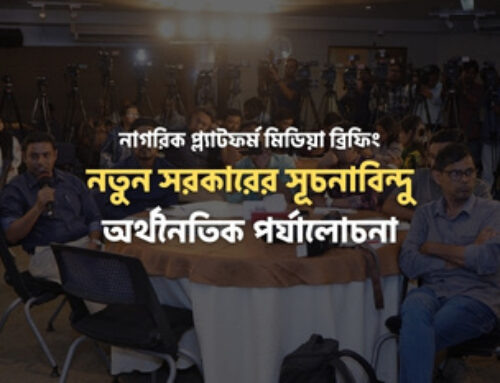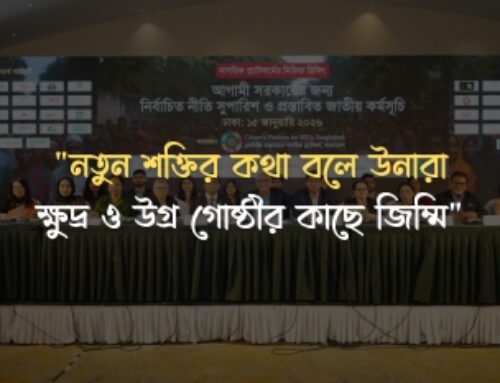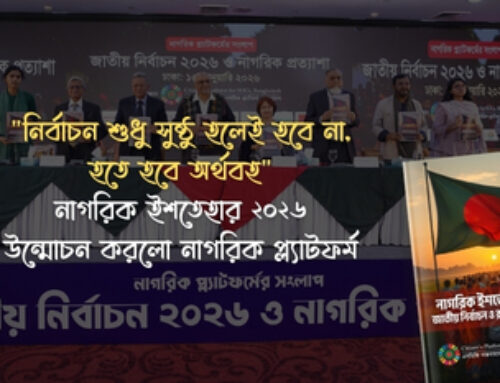Given the disadvantageous situation of the 7.7 million CMSMEs of the country, a host of stimulus packages amounting to Tk. 59, 292 crore to deal with the adverse impact of the ongoing pandemic were announced by the government since April 2020. Even though there has been some commendable change in the stimulus package guidelines such as repayment of loans through EMI, increase in total allocation in manufacturing and service amongst others, there remained impediments in accessing these packages. While the ones who have availed the stimulus packages are highly satisfied with them, the ones who have not are doing so in fear of stringent requirements. Additionally, CMSMEs bear pressure from VAT, tax, rent and collaterals which further aggravates their situation.
These concerns emerged in a virtual policy dialogue on “Post-Pandemic Status of CMSMEs and Effectiveness of Stimulus Packages”, organised jointly by the Citizen’s Platform for SDGs, Bangladesh and Business Initiative Leading Development (BUILD) on 30 September 2020.
 Mr Abul Kasem Khan, Chairperson, BUILD gave the keynote presentation. He pointed out that there are many informal CMSMEs in Bangladesh which are not registered under any systems and do not maintain any financial records. These CMSMEs are highly unlikely to benefit from the newly implemented Credit Guarantee System (CGS) which can be a tool to expedite the implementation of the working loans for CMSMEs. As loan disbursement towards CMSMEs is slower, aggressive implementation strategy ne
Mr Abul Kasem Khan, Chairperson, BUILD gave the keynote presentation. He pointed out that there are many informal CMSMEs in Bangladesh which are not registered under any systems and do not maintain any financial records. These CMSMEs are highly unlikely to benefit from the newly implemented Credit Guarantee System (CGS) which can be a tool to expedite the implementation of the working loans for CMSMEs. As loan disbursement towards CMSMEs is slower, aggressive implementation strategy ne eds to be ensured. He recommended bringing the unbanked entrepreneurs in the banking channel, stopping tax and VAT pressure, facilitating sources of alternative financing, easing the process of doing business, making CGS provisions more flexible and supportive and creating a database for the informal SMEs, amongst others.
eds to be ensured. He recommended bringing the unbanked entrepreneurs in the banking channel, stopping tax and VAT pressure, facilitating sources of alternative financing, easing the process of doing business, making CGS provisions more flexible and supportive and creating a database for the informal SMEs, amongst others.
Mr Shams Mahmud, President, Dhaka Chamber of Commerce & Industry (DCCI) raised concerns about the fundamental problem in definition of CMSMEs. Connecting medium sized enterprises with cottage, micro and small enterprises is flawed as the former’s relationship with the bank is entirely different than that of the cottage, micro and small enterprises. He went on to explain that awareness needs to be raised about stimulus packages. With the present situation in mind, Bangladesh Small and Cottage Industries Corporation (BSCIC) and SME foundation have to come up with new products for the sake of the SME stakeholders.
 Ms Humaira Chowdhury, Co-Founder & Managing Director, Frontier Technology Limited, mentioned the trouble of accessing the CGS mainly due to the requirement of mortgage payments or one-time deposits. She also highlighted that women in business are still not recognized for their intellectual capacity, rather for inherited paternal property.
Ms Humaira Chowdhury, Co-Founder & Managing Director, Frontier Technology Limited, mentioned the trouble of accessing the CGS mainly due to the requirement of mortgage payments or one-time deposits. She also highlighted that women in business are still not recognized for their intellectual capacity, rather for inherited paternal property.
 Mr. Syed Almas Kabir, President, Bangladesh Association of Software and Information Services (BASIS) mentioned that as there is no valuation guideline for Information Technology (IT), hardly any credit had been provided to the small IT firms. This absence of credit history, in turn, disabled the firms to access SPs. He pointed out that CGS is not only important for SPs. It is important for MSMEs and more so for IT companies as they do not have any tangible assets. He recommended rental subsidy for commercial spaces, installment process for paying income taxes and change in the guidelines for trade license. He also underlined the need for removal of income tax for female entrepreneurs for at least 10 years.
Mr. Syed Almas Kabir, President, Bangladesh Association of Software and Information Services (BASIS) mentioned that as there is no valuation guideline for Information Technology (IT), hardly any credit had been provided to the small IT firms. This absence of credit history, in turn, disabled the firms to access SPs. He pointed out that CGS is not only important for SPs. It is important for MSMEs and more so for IT companies as they do not have any tangible assets. He recommended rental subsidy for commercial spaces, installment process for paying income taxes and change in the guidelines for trade license. He also underlined the need for removal of income tax for female entrepreneurs for at least 10 years.
 Ms Anwara Ferdousi, President, Rangpur Women Chamber of Commerce and Industry stressed that women entrepreneurs are not at all receiving stimulus packages in
Ms Anwara Ferdousi, President, Rangpur Women Chamber of Commerce and Industry stressed that women entrepreneurs are not at all receiving stimulus packages in 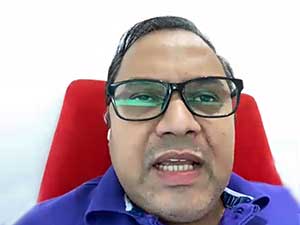 the Rangpur region. They are facing harassment when they visit the banks to access loans. She recommended the banks to reduce the cumbersome documentation necessary to access loans.
the Rangpur region. They are facing harassment when they visit the banks to access loans. She recommended the banks to reduce the cumbersome documentation necessary to access loans.
Syed Abdul Momen, Head of SME, BRAC Bank Limited stressed that there is no mention of deposits, collaterals and mortgages in accessing the stimulus packages but a requirement to adhere to the guidelines of the respective banks. Therefore, he suggested that Bangladesh Bank should disseminate circular instructing banks to stop taking collaterals in cases of stimulus packages.
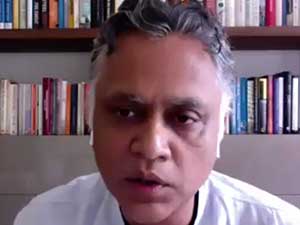 Mr Syed Nasim Manzur, Managing Director, Apex Footwear Limited and Core Group Member, Citizen’s Platform offered special comments. He reiterated that a written circular needs to go from Bangladesh Bank to remove provisions of collateral for MSME lending. Additionally, discussions with the stakeholders are necessary before any stimulus package is drafted and announced.
Mr Syed Nasim Manzur, Managing Director, Apex Footwear Limited and Core Group Member, Citizen’s Platform offered special comments. He reiterated that a written circular needs to go from Bangladesh Bank to remove provisions of collateral for MSME lending. Additionally, discussions with the stakeholders are necessary before any stimulus package is drafted and announced.
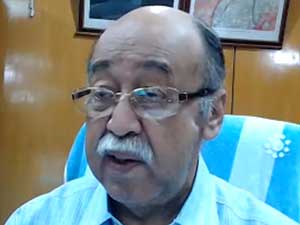 Mr Nurul Majid Mahmud Humayun, MP, Hon’ble Minister, Ministry of Industries, Government of Bangladesh, was a Chief Guest at the event. He agreed to the need for changing the definition of CMSMEs. The cottage, micro and small industries should have dedicated and specialized facilities which cannot be accessed by the medium-sized enterprises. He also mentioned about taking into note the concerns and integrating them in the policies in future.
Mr Nurul Majid Mahmud Humayun, MP, Hon’ble Minister, Ministry of Industries, Government of Bangladesh, was a Chief Guest at the event. He agreed to the need for changing the definition of CMSMEs. The cottage, micro and small industries should have dedicated and specialized facilities which cannot be accessed by the medium-sized enterprises. He also mentioned about taking into note the concerns and integrating them in the policies in future.
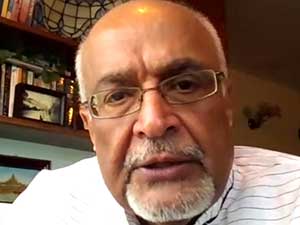 Dr Debapriya Bhattacharya, Convenor, Citizen’s Platform for SDGs, Bangladesh and Distinguished Fellow, Centre for Policy Dialogue (CPD), chaired the dialogue. He highlighted that the voices of the left behind enterprises have not reached the political corridor as yet. Alternative method of financing and issues of tax, VAT, utility bills, and rent have not been integrated in the facilities. He further stressed that the need for transformation in the banking sector, reopening of capital market and imposition of logical tax are essential in the future.
Dr Debapriya Bhattacharya, Convenor, Citizen’s Platform for SDGs, Bangladesh and Distinguished Fellow, Centre for Policy Dialogue (CPD), chaired the dialogue. He highlighted that the voices of the left behind enterprises have not reached the political corridor as yet. Alternative method of financing and issues of tax, VAT, utility bills, and rent have not been integrated in the facilities. He further stressed that the need for transformation in the banking sector, reopening of capital market and imposition of logical tax are essential in the future.
Core group members Dr Rasheda K. Choudhury, Executive Director, Campaign for Popular Education (CAMPE), Dr. Asif Ibrahim, Advisor, BUILD, and Professor Mustafizur Rahman, Distinguished Fellow, CPD were also present. The dialogue was participated by Ms Angela Gomes, Eminent Activist, Jessore and Founder and Executive Director, Banchte Shekha, policy experts and a select group of representatives from CMSME sector including women entrepreneurs.
A Briefing note will be prepared and circulated to the policymakers and relevant stakeholders.


